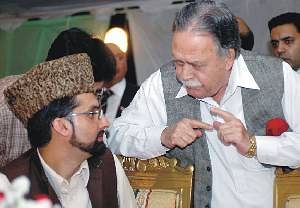Kashmiri leaders want role in Indo-Pak peace talks
Reuters, Muzzafarabad
Separatist leaders from Indian Kashmir visiting Pakistan's side of the disputed territory demanded yesterday to be part of a peace process to end violence in their homeland. After receiving a heroes' welcome when they crossed the ceasefire line a day earlier, the leaders, who will meet President Pervez Musharraf next week, stood one by one before the legislative assembly of Pakistan's Kashmir to insist that New Delhi and Islamabad bring Kashmiris into a three-way dialogue. "Such a big peace process is going on but the Kashmiris are not part of it," former militant Mohammad Yasin Malik, chairman of the Jammu and Kashmir Liberation Front, told the assembly in Azad Kashmir, as Pakistan Kashmir is called. Malik, bearded and dressed in black, warned against India, Pakistan or any power trying to promote their own preferred Kashmiris as leaders of the people. "Kashmiris have never accepted those who were imposed, foreign sponsored," the youthful, charismatic Malik said in Urdu, before switching to English to underline his message. "So, I hope this favouritism will be stopped." The speeches were broadcast live from Muzzafarabad on Pakistan state and private television channels. The nine visitors from Indian Kashmir are expected to meet Musharraf on June 7, after he returns from a visit to the United Arab Emirates, officials said. But before that they will go to Islamabad on Saturday for talks with Syed Faisal Saleh Hayat, Pakistan's Minister for Kashmir Affairs and the Northern Areas. "We have a few solid proposals, we would want to share them here with the Azad Kashmir leadership and with the leadership of Pakistan," said Mirwaiz Umar Farooq, the chief of the moderate faction of All Parties Hurriyat Conference. Farooq, the spiritual leader of Kashmiri Muslims, went on to invite the Kashmiri leadership in Pakistan back to Srinagar. Abdul Ghani Bhat, Hurriyat's spokesman, gave the most emphatic call for an end to a conflict that has cost over 45,000 lives since a Muslim separatist uprising began in 1989 in the Indian controlled Kashmir Valley. "We want an end, end to violence, we want an end, end to insecurity, we want an end, end to indignity, we want an end, end to humiliation, we want an end, end to submission," Bhat said in a speech delivered in English. "Let us give peace a chance," he said, echoing the John Lennon anthem. Indian Prime Minister Manmo-han Singh and Musharraf have called the peace process begun in early 2004 "irreversible", and a ceasefire between the nuclear rivals has largely held since November 2003. But progress over the core dispute of Kashmir, the cause of two of the three wars India and Pakistan have fought since winning independence from Britain in 1947, remains slow. The start of a bus service between Muzzafarabad and Srinagar in April was the most tangible sign of progress to date. Singh has had to overcome resistance from his own bureaucrats to allow the separatist leaders to go to Pakistan. On the other hand, Musharraf is an assassination target for militants, some linked to al Qaeda and some of them Kashmiri, who were angered by his siding with the United States in the post-Sept 11, 2001 war on terrorism, and his search for a settlement with India.
|

Head of the moderate faction of the Indian Kashmir's main separatist umbrella group, All Party Hurriyat Conference (APHC), Mirwaiz Umar Farooq (L), listens to the Pakistani Kashmir zone Prime Minister Sardar Sikandar Hayat during a meeting in Muzaffarabad Thursday. Muslim separatist leaders from Indian Kashmir proposed three-way talks on the decades old dispute over the Himalayan region after arriving here on an historic visit. PHOTO: AFP |